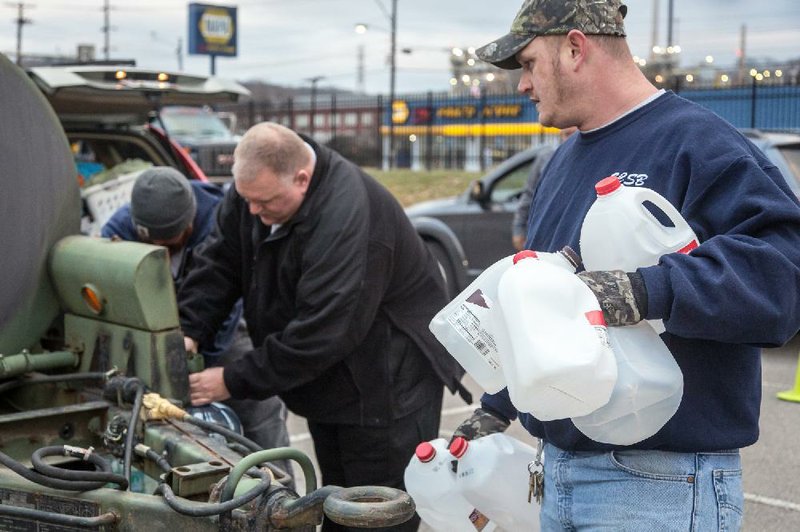DRY BRANCH, W.Va. - For Bonnie Wireman, the white plastic bag covering her kitchen faucet is a reminder that she can’t drink the water.
The 81-year-old woman placed it there after forgetting several times the tap water was tainted after a coal processing chemical leaked into the area’s water supply. Every time she turned on the water, she’d quickly stop and clean her hands with peroxide - just to make sure she was safe.
The widow of a coal miner, Wireman is frustrated about the chemical spill that’s left 300,000 West Virginians without clean tap water for four days: “I’m really angry.”
But as quickly as she said it, she wanted to make one thing clear: She didn’t blame the coal or chemical industries for the spill.
“I hope this doesn’t hurt coal,” said Wireman, who lives in Kanawha Valley, known around the state as Chemical Valley because of all the plants nearby. “Too many West Virginians depend on coal and chemicals. We need those jobs.”
The emergency began Thursday after a foaming agent used in coal processing leaked from a Freedom Industries plant in Charleston and seeped into the Elk River. Since then, residents have been ordered not to use tap water for anything but flushing toilets.
Gov. Earl Tomblin said Sunday that water tests were encouraging, but he didn’t give a timetable for when people might be able to use water again.
“The numbers look good. They are very encouraging,” Tomblin said.
Maj. Gen. James Hoyer of the West Virginia National Guard said testing near the water treatment facility has consistently been below 1 part per million, a key step officials need before they can begin the next step of flushing the system.
Once the testing is complete, the water company plans to begin lifting the do-not-use ban by zones. The work will start in downtown Charleston and three other “priority zones” that include the city’s four major hospitals and 25,000customers who use more than half of the company’s water, said Jeff McIntyre, the president of West Virginia American Water.
Government offices and many businesses planned to reopen today, while many schools in the affected areas would remain closed, officials said.
More than 150 people have showed up at emergency rooms complaining of rashes, upset stomachs and other ailments. As of Sunday, seven had been admitted for treatment, none in serious condition, according to the state’s tally. Government officials have mentioned that a number of people fall into the category of the “worried well.”
West Virginia is the second-largest coal producing state behind Wyoming, with 538 mines and 26,619 people in the industry. The state has about 150 chemical companies that employ 12,000 workers.
In Tomblin’s recent State of the State speech, he touted the chemical industry, saying it was among those that grew substantially over the past year.
The spill that tainted the water supply involved a chemical used in coal processing. But it didn’t involve a coal mine - and that’s a point state officials are trying to convey to the public.
When asked if the emergency is one of the risks of being a state that relies heavily on the coal industry, Tomblin quickly responded: “This was not a coal-company incident; this was a chemical-company incident.”
The coal industry, too, was saying it should not bear the blame in this case.
“This is a chemical spill accident. It just so happens that the chemical has some applications to the coal industry, just that fact alone shouldn’t cause people to point fingers at the coal industry,” said Jason Bostic, vice president of the West Virginia Coal Association.
Bostic said the coal industry is very carefully regulated by the state Department of Environmental Protection and several federal agencies that ensure it is safe from the very first step in opening a mine to ongoing operations.
Tomblin said he was working with Randy Huffman, the secretary of the Environmental Protection Department, to come up with recommendations aimed at avoiding future leaks.
But Angela Rosser, the executive director of West Virginia Rivers Coalition, said lawmakers have yet to explain why the storage facility was allowed to sit on the river and so close to a water treatment plant that is the largest in the state.
Rosser and others noted that the site of the spill has not been subject to a state or federal inspection since 1991. West Virginia law does not require inspections for chemical storage facilities - only for production facilities.
The Charleston Gazette-Mail reported Sunday that a team of experts from the U.S. Chemical Safety Board three years ago asked the state to create a new program to prevent accidents and releases in the Kanawha Valley.
Even as he lamented the loss of business caused by the spill, Matt Ballard, president of the Charleston Area Alliance, the state’s largest regional chamber of commerce, talked about the importance of chemical companies in the Kanawha Valley, which includes the capital.
“The chemical industry, that’s what started the valley,” Ballard said. “We’ve got a long history of a really good safety record, but with any business … there’s always a risk.” Information for this article was contributed by Mitch Weiss and Brendan Farrington of The Associated Press; by Joel Achenbach of The Washington Post; and by Coral Davenport, Ashley Southall, Daniel Heyman and Jack Begg of The New York Times.
Front Section, Pages 4 on 01/13/2014
